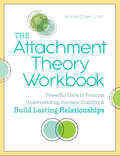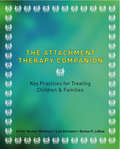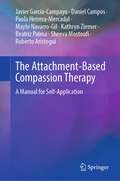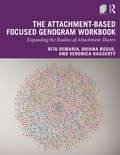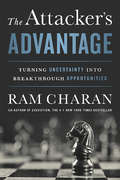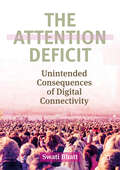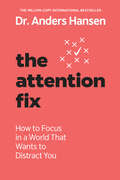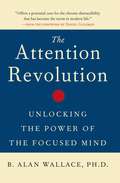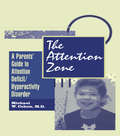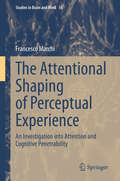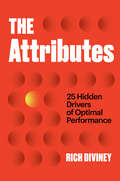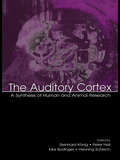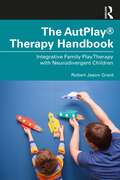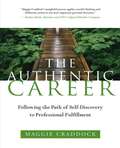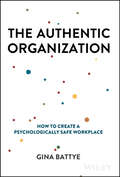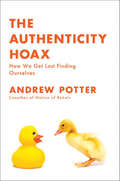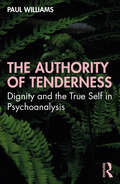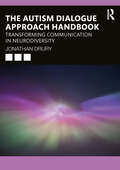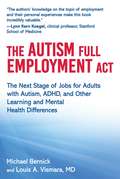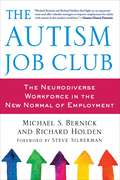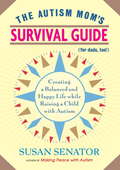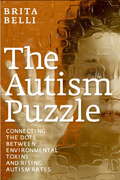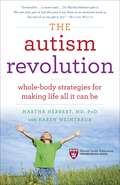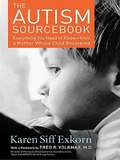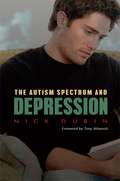- Table View
- List View
The Attachment Theory Workbook: Powerful Tools to Promote Understanding, Increase Stability, and Build Lasting Relationships (Attachment Theory in Practice)
by Annie Chen LMFTBuild stronger relationships with strategies grounded in attachment theory Attachment theory explores the different ways we develop connections with others. If you're searching for a way to create stronger, healthier, and more authentic relationships with the people you love, The Attachment Theory Workbook can help. It's your guide to understanding your own attachment style and exploring actionable exercises to improve honesty, intimacy, and communication with your partner, family, or close friends. This workbook offers: The basics of attachment theory—Find a comprehensive overview of the Anxious, Avoidant, and Secure attachment styles, with self-assessments that help you understand which ones apply to you. Active strategies for healing—Develop your relationship skills with exercises like listing what you love about someone, and answering questions about how hypothetical scenarios make you feel. For yourself and others—This expert advice helps you explore your own attachment style as well as identify the attachment style of others, so you can better understand their perspective. Lay the foundation for strong and lasting relationships with The Attachment Theory Workbook.
The Attachment Therapy Companion: Key Practices for Treating Children & Families
by Arthur Becker-Weidman Lois A. Ehrmann Denise LeBow<P> An all-in-one professional practice guide. <P> Here in a single accessible guide, is a comprehensive go-to resource on the foundational principles and treatment guidelines for doing attachment therapy. Based on the work of the Association for Treatment and Training in the Attachment of Children (ATTACh), a leading organization on attachment in child development, it provides all the nuts and bolts a clinician needs to be familiar with to provide effective, informed, attachment-focused treatment to children and families. <br> • A synopsis of attachment theory and styles <br> • Core principles of attachment-focused therapy (synchrony, attunement, reciprocity, repair, regulation, and more) <br> • Core concepts of trauma and trauma-focused therapy (resistance, therapeutic, and building a coherent narrative) <br> • Intake and assessment methods <br> • Differential diagnosis <br> • Best practice standards and interventions <br> • PTSD and other comorbidities <br> • Treatment planning and behavior management <br> • Vicarious trauma <P> Complex trauma and developmental trauma disorder are also covered in depth, as well as up-to-date information on how brain science has changed our understanding of relationships and developmental functioning, and, in turn, phases of treatment and intervention options.
The Attachment-Based Compassion Therapy: A Manual for Self-Application
by Daniel Campos Roberto Aristegui Javier García-Campayo Paola Herrera-Mercadal Mayte Navarro-Gil Kathryn Ziemer Beatriz Palma Sheeva MostoufiThis book is a manual for self-application of the Attachment-Based Compassion Therapy (ABCT) protocol, that can be either self-applied by any individual in a psychoeducational context or as a support for a therapeutic process guided by a professional. Compassion therapy is a third-generation psychotherapy that has been used in association with mindfulness in recent years. In particular, attachment-based compassion therapy (ABCT) is a protocol that can be used in both the general and psychiatric population with the aim of promoting compassion and self-compassion. ABCT is based on attachment theory and, therefore, includes practices to raise awareness and/or address maladaptive aspects, where appropriate, of the attachment styles developed with parents. This process is taught as a form of both compassion and self-compassion in order to improve present-day interpersonal relationships and well-being in general. In the face-to-face group format, ABCT has been demonstrating efficacy and applicability for healthy people and for the treatment of fibromyalgia, depression, anxiety and adjustment disorders. This book presents a self-applied version of ABCT that operates along the lines of the original model and has been adapted and developed to be fully self-applied via the Internet in 8 sequential modules:Introduction to attachment-based compassion therapyPreparing ourselves for compassion: kind attentionDiscovering our compassionate worldDeveloping our compassionate worldUnderstanding our relationship with compassionWorking on ourselvesUnderstanding the importance of forgivenessConsolidating the practice of compassion The content is presented through texts, pictures, tables and figures, including links to downloadable audio files for formal meditation practices with specific guides and instruction for each meditation. The transcripts to each guided meditation are also included as appendices.
The Attachment-Based Focused Genogram Workbook: Expanding the Realms of Attachment Theory
by Rita DeMaria Briana Bogue Veronica HaggertyThe Attachment-Based Focused Genogram Workbook is a hands-on guide for clinicians looking to integrate attachment research and family systems theory into their practice, with particular attention to intergenerational transmission processes. The book introduces a range of relationship mapping and timeline tools, grounded in the use of focused genograms and the Intersystem Approach. Examining the importance of the therapeutic bond within a variety of client-systems, the book outlines a new methodology for identifying childhood attachment patterns, adult attachment styles, family scripts and attachment narratives, and contextual social bonds. Exercises are also included throughout to encourage reflective thinking and to consolidate key concepts. Utilizing genograms as an essential tool in systemically focused family practice, this workbook will help therapists at all levels to apply and strengthen systemic considerations for clinical practice and research. The text also complements the revised edition of Focused Genograms, which uniquely applies attachment research for individuals, couples, and families in contextual clinical settings.
The Attacker's Advantage: Turning Uncertainty into Breakthrough Opportunities
by Ram CharanThe phenomenon of uncertainty is not new; what is new is its intensity and potential to change industries and destroy companies. Business leaders can be on the defensive, or they can be on offense, prepared to lead decisively. The ability to deal with uncertainty is perhaps the paramount skill leaders must have to be successful in this era. Without it they risk becoming personally obsolete and driving their companies off a cliff. In The Attacker's Advantage, renowned business expert and bestselling author Ram Charan shows what skills are needed to be able to spot the disruption that is coming, and what actions are necessary to take advantage of these changes. While many leaders know how to cope with operational uncertainty--when, for example, revenue fluctuates--the same cannot be said for dealing with structural uncertainty that can alter the money-making patterns of a company, industry or entire economic sector. Charan demonstrates the huge upside offered by structural uncertainty and provides the concepts and tools--such as being able to spot the catalysts of disruption, building organizational preparedness, developing a financial understanding of the consequences--to take advantage of forces that are creating new customer needs, market segments and ways to make money. Uncertainty is now ubiquitous. The sources of structural change are so varied and fast moving, and their convergence so unpredictable. Digitization and the integration of technologies through software and hardware has already impacted many businesses, but much more is to come. With his unparalleled ability to cut through complexity and provide workable solutions, Ram Charan provides his readers with the ability to anticipate and deal with the biggest threats facing their business.
The Attention Deficit: Unintended Consequences of Digital Connectivity
by Swati BhattDigital technology has enabled connectivity on an unimagined scale. Human beings are social animals and economic activity promotes this socialization. Market transactions are based on optimism about the future, faith that the world is good and trust that growth is organic or coming from within the system. Individuals therefore invest in the future by having children, by extending credit and accepting risk, and by building connections with others in the sincere expectation of this connectivity being reciprocated. This book explores the unintended consequences of ubiquitous connectivity. The first effect is captured by the sharing model. Technology offers multiple avenues for sharing experiences and personal information, so active engagement with this increased content uses mental effort. Connection inevitably leads to comparisons with other groups and individuals, so despite the benefits of affirmation and group inclusion, these links corrode social networks, leading to depression and mental apathy. The second effect--the result of the commercialization of sharing--is encapsulated in the attention deficit model. Loss of self-worth, driven by the first effect, encourages further connectivity and sharing as buyers seek more comfort and reassurance via social media, paying with time and personal information. The product is digital content and the payment is with time and data. Correspondingly, social media fulfills this demand with exuberance, both via user-generated content and commercially curated content. We are overwhelmed with even more information, paying with increasingly scarce time and attention. Finally, the third and most consequential effect is diminished risk taking. Attention scarcity, as a consequence of the content tsunami, throttles cognitive effort, impairing judgment and decision-making. So the safe bet may be to do nothing . . . take no risks and no gambles. Weaving together the latest research on economics, psychology, and neuroscience, this book fills a void for readers wanting a smart, clear analysis of communications markets and the commercialization of Internet-inspired connectivity.
The Attention Fix: How to Focus in a World That Wants to Distract You
by Anders Hansen&“Anders Hansen&’s work is the antidote to our modern-day struggles.&”—Dr. Rangan Chatterjee, author of The Stress SolutionTake charge of your attention and break free from the digital overload with The Attention Fix by internationally bestselling, award-winning psychiatrist Dr. Anders Hansen.In this powerful guide, Dr. Hansen provides groundbreaking strategies to reclaim your focus and mental well-being. Unveiling the evolutionary reason for our distractibility, The Attention Fix sheds light on the toll our constant connection to smartphones and digital devices takes on our mental well-being. Backed by extensive research and studies, Dr. Hansen&’s insights are scientifically proven and enriched through his exploration of the intricacies of the human brain. With The Attention Fix, you can gain a comprehensive understanding of the latest scientific research on the brain and the true effects of unrestricted social media use, breaking free from the cycle of mindless scrolling and demotivation. Curb your addiction to screens and cultivate deep, single-task focus to experience a renewed sense of happiness, improved health, and enhanced productivity. Break free from the addiction cycle of mindless scrolling and demotivation utilizing Dr. Hansen&’s groundbreaking strategies.Dr. Hansen&’s expertise and insights are trusted by renowned experts and influential figures in mental health, fitness, and overall well-being. Learn about the latest scientific research on the brain as you gain a comprehensive understanding of the true effects of unrestricted social media use. Cure smartphone addiction and cultivate attention management skills to ease anxiety, find better focus, and decrease attention deficit symptoms.Understand the impact of our evolutionary traits in the modern world and explore the consequences of our physical and mental traits. Uncover the detrimental impact of unrestricted social media use on your brain and empower yourself to reclaim your attention span.
The Attention Revolution
by Daniel Goleman B. Alan WallaceMeditation offers, in addition to its many other benefits, a method for achieving previously inconceivable levels of concentration. Author B. Alan Wallace has nearly thirty years' practice in attention-enhancing meditation, including a retreat he performed under the guidance of the Dalai Lama. An active participant in the much-publicized dialogues between Buddhists and scientists, Alan is uniquely qualified to speak intelligently to both camps, and The Attention Revolution is the definitive presentation of his knowledge. Beginning by pointing out the ill effects that follow from our inability to focus, Wallace moves on to explore a systematic path of meditation to deepen our capacity for deep concentration. The result is an exciting, rewarding "expedition of the mind," tracing everything from the confusion at the bottom of the trail to the extraordinary clarity and power that come with making it to the top. Along the way, the author also provides interludes and complementary practices for cultivating love, compassion, and clarity in our waking and dreaming lives. Attention is the key that makes personal change possible, and the good news is that it can be trained. This book shows how.
The Attention Zone: A Parent's Guide To Attention Deficit/Hyperactivity
by Michael CohenFirst published in 1998. Routledge is an imprint of Taylor & Francis, an informa company.
The Attentional Shaping of Perceptual Experience: An Investigation into Attention and Cognitive Penetrability (Studies in Brain and Mind #16)
by Francesco MarchiThis monograph presents a clear account of when and how attentional processes can shape perceptual experience. This argument is based on the prediction-error minimization model of the mind. The author believes that the topic of attention should take a more central role in the debate about the influence of cognition on perception. Inside, he shows how this can be possible.The hypothesis that cognition may shape perceptual experience has been traditionally labeled as the cognitive penetrability of perceptual experience. Cognitive penetrability is relevant for several debates in philosophy and cognitive science. It tackles the possibility of gathering genuine knowledge on the basis of perceptual information about the world delivered by sensory channels. The problem, the author notes, is that if our previously acquired belief can shape current perceptual experiences, such experiences cannot serve as an adequate source of justification in retaining those beliefs or even forming new ones. He argues that cognitive penetration may sometimes happen through attentional processes, but that its occurrence need not undermine perceptual justification.The book provides an overview of the cognitive penetrability debate. The author discusses evidence that supports the occurrence of this phenomenon. Overall, this investigation offers readers a philosophical discussion of attention based on the biased-competition theory. It argues that attention is a property of mental representations that emerges from a metacognitive competition process.
The Attributes: 25 Hidden Drivers of Optimal Performance
by Rich DivineyDo you have what it takes to succeed in any situation? According to a retired commander who ran training for Navy SEALs, true optimal performance goes beyond just skill. It&’s all about THE ATTRIBUTES.&“Diviney&’s incredible book explains why some people thrive—even when things get hard.&”—Charles Duhigg, New York Times bestselling author of The Power of HabitDuring his twenty years as a Navy officer and SEAL, Rich Diviney was intimately involved in a specialized SEAL selection process, which whittled a group of hundreds of extraordinary candidates down to a handful of the most elite performers. Diviney was often surprised by which candidates washed out and which succeeded. Some could have all the right skills and still fail, while others he might have initially dismissed would prove to be top performers. The seemingly objective criteria weren&’t telling him what he most needed to know: Who would succeed in one of the world&’s toughest military assignments?It is similarly hard to predict success in the real world. It happens often enough that underdog students accomplish exceptional achievements while highly skilled, motivated employees fail to meet expectations. Dark-horse companies pull away from the pack while dream teams flush with talent and capital go under. In working with and selecting top special operators for decades, Diviney saw that beneath obvious skills are hidden drivers of performance, surprising core attributes—including cunning, adaptability, courage, even narcissism—that determine how resilient or perseverant we are, how situationally aware and how conscientious. These attributes explain how we perform as individuals and as part of a team. The same methodology that Diviney used in the military can be applied by anyone in their personal and professional lives, and understanding these attributes can allow readers and their teams to perform optimally, at any time, in any situation.Diviney defines the core attributes in fresh and practical ways and shares stories from the military, business, sports, relationships, and even parenting to show how understanding your own attributes and those of the people around you can create optimal performance in all areas of your life.
The Auditory Cortex: A Synthesis of Human and Animal Research
by Reinhard König Peter Heil Eike Budinger Henning ScheichUnderstanding human hearing is not only a scientific challenge but also a problem of growing social and political importance, given the steadily increasing numbers of people with hearing deficits or even deafness. This book is about the highest level of hearing in humans and other mammals. It brings together studies of both humans and animals thereby giving a more profound understanding of the concepts, approaches, techniques, and knowledge of the auditory cortex. All of the most up-to-date procedures of non-invasive imaging are employed in the research that is described.
The AutPlay® Therapy Handbook: Integrative Family Play Therapy with Neurodivergent Children
by Robert Jason GrantThe AutPlay® Therapy Handbook provides a thorough explanation and understanding of AutPlay® Therapy (an integrative family play therapy framework) and details how to effectively implement AutPlay® Therapy for addressing the mental health needs of autistic and neurodivergent children and their families. This handbook guides the mental health therapist working with children and adolescents through their natural language of play. Opening with an extensive review of the neurodiversity paradigm and ableism, the chapters cover AutPlay® Therapy protocol, phases of therapy, assessment strategies, and common need areas along with understanding neurodiversity affirming processes. Additional chapters highlight the therapeutic powers of play, integrative play therapy approaches, understanding co-occurring conditions, working with high support needs, and using AutPlay® Therapy to address regulation, sensory, social/emotional, and other mental health concerns that neurodivergent children may be experiencing. The handbook serves as a thorough guide for play therapists, child therapists, and family therapists who work with neurodivergent children and their families.
The Authentic Career: Following the Path of Self-Discovery to Professional Fulfillment
by Maggie Craddock<p>Most people suffer from some sort of job dissatisfaction. But figuring out whether they should change or their jobs should change isn’t easy. From a leading executive coach comes <i>The Authentic Career</i>, perhaps the first book to provide readers with a formal sequence that combines professional, psychological, and spiritual resources to achieve career success and fulfillment. <p>The four-stage process — clearly outlined and filled with exercises, examples, and inspirational quotes — has proven successful for the author’s clients of all levels, from Fortune 500 CEOs to professional women returning to the workforce after having children. <p>Craddock combines her business background as a Lipper Award–winning fund manager with her training as a social worker and years of experience as an executive coach to outline a therapeutic process that clearly separates what we want and need in order to find fulfillment from the external demands and expectations that family, society, and the workplace impose on us. Identifying our authentic career goals and strategies requires that we carefully examine our inner lives, Craddock believes, separating them from the daily demands and frustrations of our work lives.</p>
The Authentic Organization: How to Create a Psychologically Safe Workplace
by Gina Battye"The Authentic Organization is an empowering guide, offering an approachable framework for organizations to go beyond diversity and inclusion. It is an invaluable resource for any leader hoping to gain and maintain a competitive edge in today's talent market!" - Sergio Rodriguez, Senior Manager, Global Workforce DEI Solutions "The Authentic Organization deals with a hugely important topic – how to create Psychological Safety in the workplace. This book is insightful, practical, fun and easy to read!" -Andreas Richter, Professor of Organisational Behaviour, University of Cambridge “This is a timely book, written with heart. There is an increasing focus on Psychological Safety and Gina brings the concept to life, explaining how to make it a reality for everyone in our organisations.” -Simon Blake, Chief Executive Officer, Mental Health First Aid England Mastering Psychological Safety: Your definitive guide to cultivating a psychologically safe workplace In The Authentic Organization: How to Create a Psychologically Safe Workplace, CEO of the Psychological Safety Institute Gina Battye, delivers a hands-on manual to create work environments where people thrive. You’ll discover actionable strategies to establish a psychologically safe workplace; challenging and transforming workplace attitudes and outdated workplace cultures. Expect to experience a paradigm shift where psychological safety is at the core, enabling an inclusive culture and catalyzing organizational success. This book goes beyond the mechanics of creating a safe workplace, it also empowers individuals to unleash their authentic selves, not just surviving, but truly thriving, both professionally and personally. You’ll gain valuable insights and practical guidance to bring your authentic self to work, effectively navigate workplace interactions and create a highly conducive environment for teamwork and collaboration. Ultimately, you will have everything you need to drive cultural change and take an active role in creating a psychologically safe environment that empowers your team and transforms your entire organization. Gina masterfully navigates you through her distinctive approach, the world-renowned 5 Pillars of Psychological Safety framework, meticulously designed to cultivate an environment where your organization and people thrive. Within these pages you will encounter: A transformative process that empowers individuals to bring their Authentic Self to work, tapping into hidden capabilities to excel in their professional lives. A comprehensive communication framework that equips individuals to effortlessly master effective workplace interactions. A ground-breaking methodology that cultivates an environment where teams thrive and collaborate effectively in a calm and focused workplace setting. A must-read blueprint for anyone aiming to create psychologically safe work environments, The Authentic Organization is your comprehensive guide to cultivating a workplace where individuals and teams thrive. This book is the ultimate manual that leaders, managers, human resources professionals, Employee Resource Group leads, and business innovators have been waiting years for.
The Authenticity Hoax: How We Get Lost Finding Ourselves
by Andrew PotterExploring a number of trends in our popular culture, Andrew Potter argues that our pursuit of the authentic is fraught with irony and self-defeat.Thought provoking and revelatory, The Authenticity Hoax exposes how the search for the “true” and “real” is rooted in a society obsessed with individual elitists suckered into believing that their lifestyles are the only genuine ones in a fake world. Manipulated by the inescapable consumerism and sound bites of contemporary life, influenced ethically and politically, people embrace an artificiality borne of mass culture that alienates relationships and communities.In this no holds barred critique of modernism, Andrew Potter also shares how we stop worrying about being “authentic” and learn how to find peace and meaning with our current world, the people around us, and ourselves.“A totally real, genuine, authentic book about why you shouldn’t believe any of those words. And it’s genuinely good.” —New York Times bestselling author Gregg Easterbrook“It’s a fascinating approach to a fascinating subject, and Potter bolsters his argument with examples drawn from pop culture, history, and other sources. Written in a lively style that invites the reader to argue with the author, the book, at the very least, will turn the reader’s eye inward, and make us take a good, long look at the way we present ourselves to the world.” —Booklist“Potter’s lively cultural analysis combines an astute analysis of foundational antimodernist thought (in particular Rousseau) with savvy surveys of mass culture to flag the pitfalls and ironies of the modern obsession with authenticity in its every incarnation (authentically punk, spiritual, environmentally conscious) from our jeans to our celebrities.” —Publishers Weekly
The Authority of Tenderness: Dignity and the True Self in Psychoanalysis
by Paul WilliamsThis insightful and beautifully written work explores nonlinear processes of recovery of the loss of Self. The inherent healing power of hard-earned, wholehearted self- acceptance is conceived through the authority of tenderness. The book is the final volume in The Fifth Principle trilogy (the second book being Scum), which chronicled, through the course of one boy’s lifetime, the methods of a mind which is not a mind, in its efforts to prevail under oppressive circumstances. The Authority of Tenderness comes at the end of the journey, is written by the adult self of the child, and uses poetic vignettes, references to foundational psychoanalytic literature and analyses of critical treatment situations to convey the experiences of someone who has been both patient and analyst. The book offers a vivid psychotherapeutic perspective for clinicians, trainees, students and general readers alike.
The Autism Dialogue Approach Handbook: Transforming Communication in Neurodiversity
by Jonathan DruryThe Autism Dialogue Approach Handbook serves as both a comprehensive guide and a practical handbook for healthcare professionals, educators, caregivers and anyone engaging with the autism community. Jonathan Drury presents the Autism Dialogue Approach (ADA), a pioneering framework rooted in dialogue and mindfulness practices. It addresses the diverse needs of autistic and neurodivergent individuals, emphasising that ‘the autism community’ includes everyone, promoting an inclusive understanding of neurodiversity.The book critiques traditional therapeutic and coaching models, proposing ADA as an alternative that values co-creation and shared meaning-making. By exploring practical strategies, Drury demonstrates how ADA transforms therapy, coaching and leadership by fostering environments where neurodivergent and neurotypical individuals can connect authentically and transcend division. With clear tools, exercises and real-world examples, this handbook guides readers in applying ADA to cultivate neurodivergent-affirming, inclusive spaces. It also delves into the philosophical and spiritual dimensions of dialogue, offering insights into how societal structures impact autistic experiences and how systemic change can occur through dialogue.Aimed at those committed to building compassionate and inclusive settings, this handbook equips readers with practical skills for nurturing deep connections, promoting wellbeing and driving societal transformation through a neurodiversity-affirming approach.
The Autism Full Employment Act: The Next Stage of Jobs for Adults with Autism, ADHD, and Other Learning and Mental Health Differences
by Michael Bernick Louis A. VismaraImpactful and integral to our economic recovery after the pandemic, The Autism Full Employment Act will rebuild and approve autism employment programs. Employment remains the issue today for many adults with autism. During the pandemic of 2020, authors Michael Bernick and Dr. Lou Vismara, along with other adults with autism, practitioners, and advocates, set out to develop an Autism Full Employment Act. At the time, the national economy was decimated, and it was clear that it would need to be rebuilt, starting in 2021 and beyond. The Act is an attempt not only to rebuild autism employment programs, but also to address the limitations and shortcomings of the current system. The Autism Full Employment Act shows how there can be a place in the job world for the wide range of adults with autism, ADHD, and other learning and mental health differences—many of whom are not employed today. Bernick and Dr. Vismara review the autism employment initiatives in recent years among major employers, state and local governments, autism-focused businesses, and autism transition programs, and present strategies to build on these initiatives. They set out more fully the meanings of &“autism talent advantage,&” &“autism friendly workplace,&” and &“employment for the more severely impacted.&” Six broad strategy areas are explored. Interspersed with these six strategy areas are notes on related issues of &“professionalizing the direct support workforce,&” &“transitions,&” and &“comorbidities.&” Bernick and Dr. Vismara end by considering why no government action or program can replace the employment journey of each adult with autism, but how instead the Act can hasten these journeys.
The Autism Job Club: The Neurodiverse Workforce in the New Normal of Employment
by Steve Silberman Richard Holden Michael BernickThe Autism Job Club is a groundbreaking book for bringing adults with autism and other neuro-diverse conditions into the work world. This second edition of The Autism Job Club includes a new Foreword by Steve Silberman, author of the best-selling NeuroTribes, along with an Afterword by the authors. The Afterword covers the many employment initiatives for adults on the autism spectrum launched just in the three years since the book was originally published. The book has its basis in the autism job club that the authors have been part of in the San Francisco Bay Area, the job-creation and job-placement efforts the club has undertaken, and similar efforts throughout the United States. The authors review the high unemployment rates among adults with autism and other neuro- diverse conditions more than two decades after the ADA. Bernick and Holden also outline and explain six strategies that, taken together, will reshape employment for adults with autism: the art of the autism job coach; the autism advantage in technology employment; autism employment and the internet economy; autism employment and the practical/craft economy; autism and extra-governmental job networks; autism and public service employment.The Autism Job Club is a vital resource for adults with autism, their families, and advocates who are committed to neuro-diverse employment, not unemployment. But it also speaks to a far broader audience interested in how to carve out a place for themselves or others in an increasingly competitive job world.
The Autism Mom's Survival Guide (for Dads, too!): Creating a Balanced and Happy Life While Raising a Child with Autism
by Susan SenatorGiven the daily challenges of raising a child with autism, it's easy for parents to lose themselves and for their overall quality of life to plummet. Susan Senator interweaves the voices of autism parents, researchers, and professionals to offer guidance and encouragement on how to find happiness and fulfillment in the midst of the struggles of raising an autistic child. Topics include: how to handle feelings of despair and hopelessness; finding fun, even during turbulent times; caring for your marriage; and finding a balance between accepting your child as he or she is and seeking new treatments. To learn more about the author, visit her website at susansenator.com.
The Autism Puzzle
by Brita BelliThe alarming spike in autism in recent years has sent doctors and parents on a search for answers. And while many controversies have erupted around the issue, none have gotten us any closer to a definitive explanation, and many key concerns remain unexplored. Moving beyond the distractions of the vaccine debate, The Autism Puzzle is the first book to address the compelling evidence that it is the pairing of environmental exposures with genetic susceptibilities that may be impacting the brain development of children. Journalist Brita Belli brings us into the lives of three families with autistic children, each with different ideas about autism, as she explores the possible causes. She interprets for readers compelling evidence that environmental toxins--including common exposures from chemicals mounting in our everyday lives--may be sparking this disorder in vulnerable children. Belli calls for an end to the use of hazardous materials--like toxic flame retardants used in electronics and furniture, which have been banned elsewhere--insisting that we cannot afford to experiment with our children. The Autism Puzzle puts a human face on the families caught in between the debates, and offers a refreshingly balanced perspective.
The Autism Revolution: Whole-body Strategies for Making Life All It Can Be
by Karen Weintraub Martha HerbertMove beyond conventional thinking about autism. . . . After years of treating patients and analyzing scientific data, prominent Harvard researcher and clinician Dr. Martha Herbert offers a revolutionary new view of autism and a transformative strategy for dealing with it. Autism is not a hardwired impairment programmed into a child's genes and destined to remain fixed forever, as we're often told. Instead, it is the result of a cascade of events, many seemingly minor: perhaps a genetic mutation, some toxic exposures, a stressful birth, a vitamin deficiency, and a series of infections. And while other doctors may dismiss your child's physical symptoms--the diarrhea, anxiety, sensory overload, sleeplessness, immune challenges, and seizures--as coincidental or irrelevant, Dr. Herbert sees them as vital clues to what the underlying problems are, and how to help. In The Autism Revolution, she teaches you how to approach autism as a collection of problems that can be overcome--and talents that can be developed. Each success you achieve gives your child more room to become healthy and to thrive. Drawing from the newest research, technologies, and insights, as well as inspiring case studies of both children and adults, Dr. Herbert guides you toward restoring health and resiliency in your loved one with autism. Her specific recommendations aim to provide optimal nutrition, reduce toxic exposures, shore up the immune system, reduce stress, and open the door to learning and creativity--all by understanding and truly meeting your child's needs. As thousands of families who have cobbled together these solutions themselves already know, this program can have dramatic benefits--for your child with autism, and for you, your whole family, and your next baby as well. A paradigm-changing book that offers hope and healing for the millions of families who have autism in their lives, The Autism Revolution shows that there's plenty you can do every day to give someone you love the best possible gift: a life lived to the fullest potential.From the Hardcover edition.
The Autism Sourcebook: Everything You Need to Know about Diagnosis, Treatment, Coping, and Healing--From a Mother Whose Child Recovered
by Karen Siff ExkornPractical advice and information from the world's foremost experts on autism -- and a mother's own hard-won lessons from helping her son recover from the disorder. When Karen Siff Exkorn's son, Jake, was diagnosed with autism, she struggled to pull together comprehensive information about the disorder. Fortunately, she was able to educate herself quickly, and her extensive at-home treatment of her son led to his amazing full recovery. But the journey wasn't easy, and now, in The Autism Sourcebook, Siff Exkorn offers parents the wisdom she wishes she'd had at the beginning. Providing accessible medical information gleaned from the world's foremost experts, Siff Exkorn offers an inside look at families with children who have autism, and ties in her own firsthand experience as a parent. The author shares valuable knowledge about the following: *What the diagnosis really means * Understanding and accessing treatment options * Knowing your child's rights in the school system * Coping with common marital and familial stress * Making the stigma of autism a thing of the past With extensive appendices, including the Modified Checklist for Autism in Toddlers, Diagnostic Criteria for the Five Pervasive Developmental Disorders, and carefully selected lists of Internet resources, recommended readings, and top autism organizations worldwide, The Autism Sourcebook is the single most comprehensive, practical resource available to parents and loved ones of children with autism.
